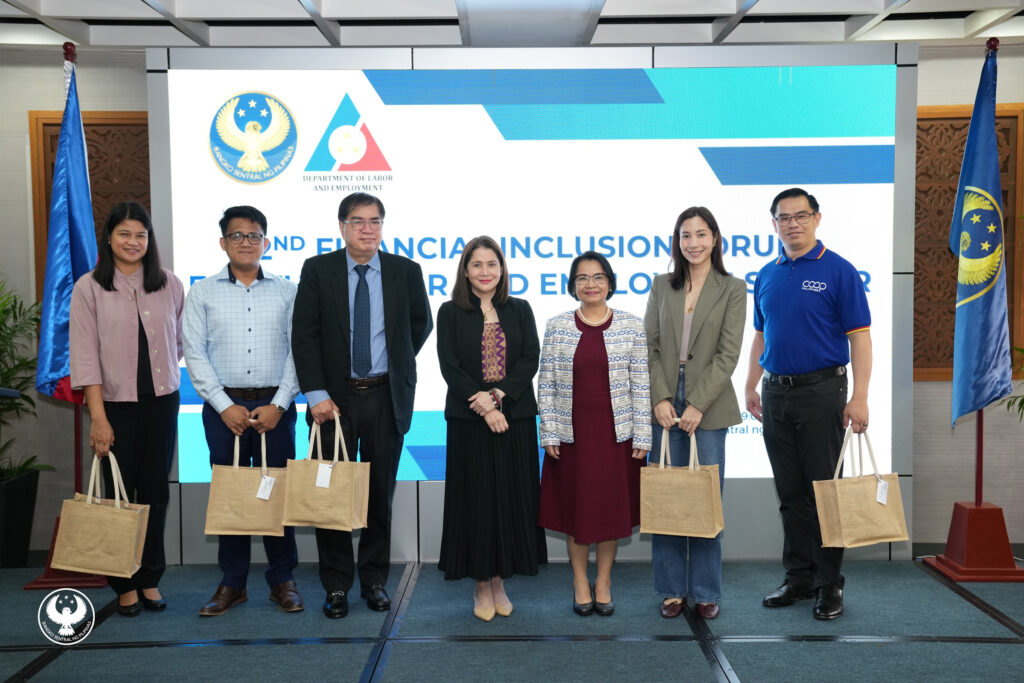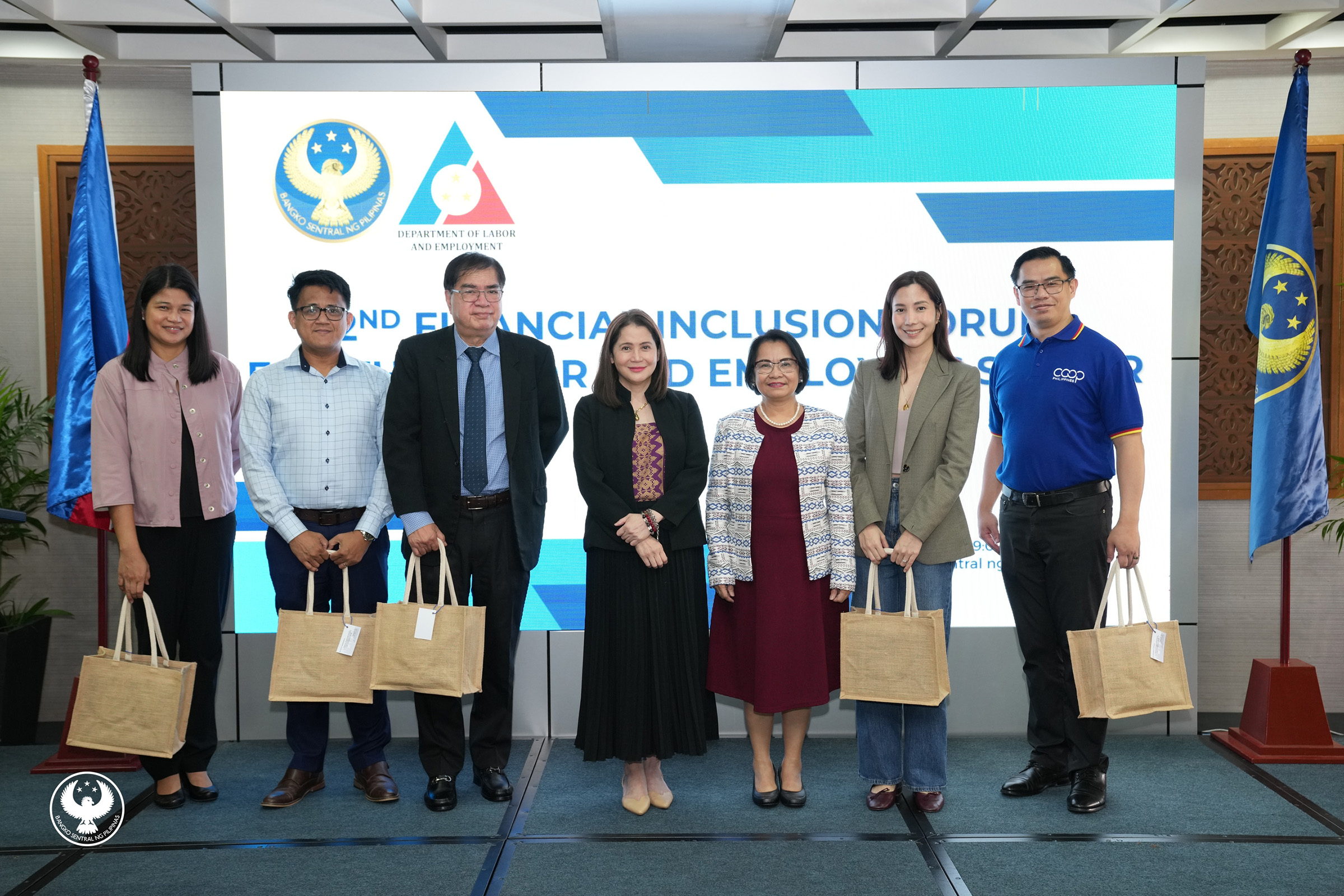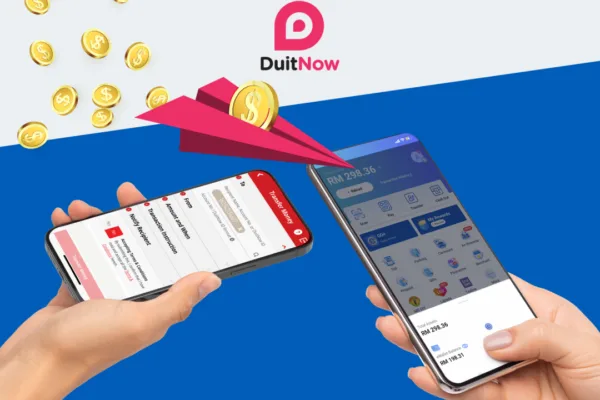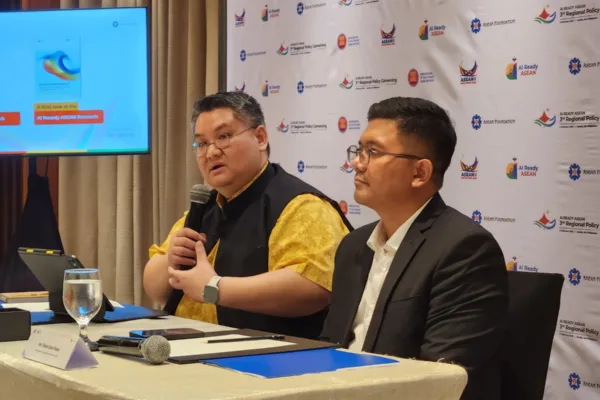The Bangko Sentral ng Pilipinas (BSP) and the Department of Labor and Employment (DOLE) are calling on labor and employer sector leaders to embrace digital wage payments as a critical step toward enhancing financial inclusion in the Philippines.

Photo shows BSP Deputy Governor (DG) Bernadette Romulo-Puyat and Labor Assistant Secretary Amuerfina Reyes after leading the discussions on promoting digital wage payments at the 2nd Financial Inclusion Forum for the Labor and Employers Sector at the BSP Manila Head Office. Joining them are, from left, BSP Director Rochelle Tomas, BSP Bank Officer Ruel Despabiladeras, Employers Confederation of the Philippines Governor Federico Marquez, Jr., BSP DG Romulo-Puyat, DOLE Asec. Reyes, Maya Philippines Business Development Head of Ecosystem and Tech Partnerships Beatrice Carla Bengzon, and Cooperative Insurance System of the Philippines Chief of Underwriting Officer and Chief Technology Officer Christopher Marquez.
This initiative was the focal point of discussions at the “2nd Financial Inclusion Forum for the Labor and Employers Sector” held recently at the BSP’s head office in Manila. The forum likewise underscored the importance of transitioning from traditional cash-based wage payments to digital payroll solutions.
BSP advocating for a digital shift in the payment of salaries
According to the “2021 Financial Inclusion Survey” conducted by the BSP, approximately 70 per cent of private sector salaries in the country are still disbursed in cash.

This reliance on physical currency presents challenges in terms of financial inclusion and economic efficiency, prompting the BSP and the DOLE to advocate for a digital shift.
Digitalizing wage payments is not only a matter of convenience but also a powerful tool for fostering financial inclusion. Research shows that in developing countries, more than half of adults opened their first bank accounts to receive digital wage payments.
This statistic highlights the transformative potential of digital wage payments in expanding access to financial services.
For employees, receiving wages digitally can unlock access to a variety of financial products and services, such as savings accounts and insurance plans, which are crucial for enhancing financial resilience and overall well-being. By receiving their earnings through digital means, workers are better positioned to manage their finances, save for future needs, and secure their families’ financial stability.
On the employer side, digital wage payments offer several significant benefits. These include improved productivity, increased accuracy in wage disbursement, enhanced safety, and better access to finance and markets.
Additionally, digital payments support the formalization of enterprises, making it easier for businesses to comply with regulations and participate in the formal economy. Earlier this month, the BSP and the Trust Officers Association of the Philippines also emphasized the importance of smart retirement investments at the Personal Equity and Retirement Account (PERA) forum held at the BSP head office in Manila, thus helping bolster financial security for Filipinos.
Inclusive financial system to benefit both employees and employers
DOLE Assistant Secretary Amuerfina Reyes highlighted the advantages of digital wage payments during her remarks at the forum. “Through the promotion of financial inclusion and a digital wage payment system, income receipt becomes more convenient, faster, and safer,” she stated. “It also ensures that workers receive their wages in full and on time.”
Reyes further emphasized that digital payments provide broader access to financial services and information, enabling individuals to save and strengthen their family’s financial security. This aligns with the government’s broader efforts to support the financial well-being of Filipino workers.
BSP Deputy Governor Bernadette Romulo-Puyat echoed these sentiments, stressing that financial inclusion is a collective national effort. She highlighted the value that digital wage payments bring to both labor and business sectors and called for sustained promotion of the shift from cash to digital payments. “Let us continue working together to make the goal of a more financially inclusive and resilient Philippines a reality,” she urged.
The forum also featured insights from industry experts, including International Labor Organization Social Finance Technical Expert Valérie Breda, Employers Confederation of the Philippines Governor Federico Marquez, Jr., Maya Philippines Business Development Head Beatrice Carla Bengzon, and Cooperative Insurance System of the Philippines CTO Christopher Marquez, among others.
These speakers shared their knowledge about the products and services that promote financial health and resilience for employees, such as microinsurance and the Personal Equity and Retirement Account (PERA).
A key takeaway from the forum was the need to strengthen security and infrastructure to enable wider adoption of digital wage payments. The discussions underscored that as digital payment systems become more widespread, ensuring consumer protection and maintaining robust security measures will be essential.
The BSP-DOLE forum aligns with the National Strategy for Financial Inclusion (NSFI) 2022-2028, which prioritizes expanding the use of digital payments in the country. By promoting digital wage payments, the BSP and DOLE are now aiming to create a more inclusive financial system that benefits both employees and employers, paving the way for a stronger, more resilient Philippine economy.








